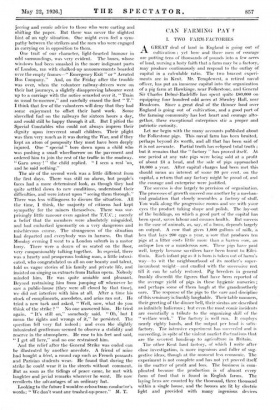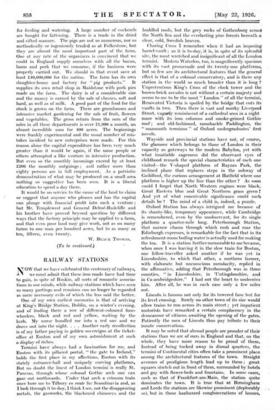CAN FARMING PAY ?
I. TWO FARM-FACTORIES AGREAT deal of land in England is going out of cultivation ; yet here and there men of courage are putting tens of thousands of pounds into a few acres of land, nursing a lusty faith that a farm may be a factory,. may produce continuously and respond to the outlay of capital in a calculable ratio. The two bravest experi- ments are in Kent. Mr. Templewest, a retired naval- officer, has put an immense capital into the organization of a pig farm at Hawkinge, near Folkestone, and General Sir Charles Ddme-Radeliffe has spent quite £80,000 on• equipping four hundred odd acres at Shenley Hall, near Headcorn. Since a great deal of. the thinner land over England is going out of cultivation, and a good part of the farming community has lost heart and courage alto- gether, these exceptional enterprises stir a proper and patriotic curiosity.
Let me begin with the many accounts published about the Folkestone pigs. This naval farm has been bruited,. perhaps beyond its worth, and all that has been said of it is not accurate. Partial truth has eclipsed total truth ; but it remains that the " factory " has proved itself. At one period at any rate pigs were being sold at a profit of about £3 a head, and the sale of pigs approached 10,000 a year. After capital charges had been met this should mean an interest of some 80 per cent. on the capital, a return that any factory might be proud of, and the courage and enterprise were justified.
The success is due largely to precision of organization. The processes of growth succeed one another by a mechan- ical gradation that closely resembles a factory of stuff. You walk along the progressive rooms and see with your eyes the product taking shape and polish. The lay-out of the buildings, on which a good part of the capital has been spent, saves labour and ensures health. But success in the case of animals, as, say, of a loom, depends largely on output. A cow that gives 1,000 gallons of milk, a hen that lays 200 eggs a year, .a sow that produces ten pigs at a litter costs little more than a barren cow, an antique hen or a murderous sow. These pigs have paid well, largely because sacrifices have been burnt to Eilei- thuia. Each infant pig as it is born is taken out of harm's way—to wit the neighbourhood of its mother's super- incumbent weight—and cradled with the successive rest till it can be safely restored. Pig breeders in general frankly discredit the figures that have been reported of the average yield of pigs in these hygienic nurseries ; and perhaps some of them laugh at the grandmotherly care. The response of the pigs to the care and discipline of this seminary is frankly laughable. Their table manners, their greeting of the dinner bell, their siestas are described as infinitely ludicrous ; but even the most comic incidents are essentially a tribute to the organizing skill of the " welfare work." The factory is well run. It employs nearly eighty hands, and the output per head is satis- factory. The intensive experiment has succeeded and is succeeding, in spite of the violent market fluctuations that are the severest handicap to agriculture in Britain.
• The other Kent land factory, of which I write after close investigation, is more ingenious and fuller of sug- gestive ideas, though at the moment less economic. The experiment is not complete and has not yet proved itself iri the matter of profit and loss. The business is com- plicated because the production is of almost every form of food that is found in English farms. The laying hens are counted by the thousand, three thousand within a single house, and the houses are lit by electric light and provided with many ingenious devices for feeding and watering. A large number of cockerels are bought for fattening. There is a trade in the dried and sifted manure. The pigs are not so numerous, nor so methodically or ingeniously tended as at Folkestone, but they are almost the most important part of the farm. One at any rate of the organizers is convinced that we could in England supply ourselves with all the bacon, hams and pork that we consume, if the business were properly carried out. We should in that event save at least £40,000,000 for the nation. The farm has its own slaughter-house and factory for " pig products." It supplies its own retail shop in Maidstone with pork pies made on the farm. The dairy is of a considerable size and the money is earned by the sale of cheeses, soft and hard, as well as of milk. A good part of the food for the stock is grown on the farm. There are greenhouses and intensive market gardening for the sale of fruit, flowers and vegetables. The gross return from the sum of the sales in all these departments is over 11,900 a month, an almost incredible sum for 400 acres. The beginnings were frankly experimental and the usual number of mis- takes incident to new enterprises were made. For this reason alone the capital expenditure has been very much greater than it would be again, if the same people or others attempted a like venture in intensive production. But even so the monthly incomings exceed by at least £200 the monthly outgoings ; anti rather more than eighty persons are in full employment. As a patriotic demonstration of what may be produced on a small area nothing so suggestive has been seen. It is a liberal education to spend a day there.
It would be no service to the cause of the land to claim or suggest that anyone who pleases and has the capital can plunge with financial profit into such a venture ; but Mr. Templewest and General Delme-Radcliffe and his brother have proved beyond question by different ways that the factory principle may be applied to a farm, and that even poor land may give work, not as on many farms to one man per hundred acres, but to as many as ten, fifteen, even twenty.
IV. BEACH THOMAS.
(To be continued.)















































 Previous page
Previous page